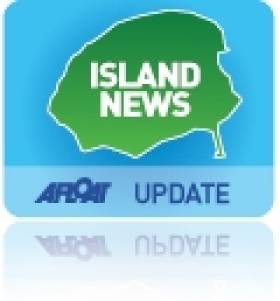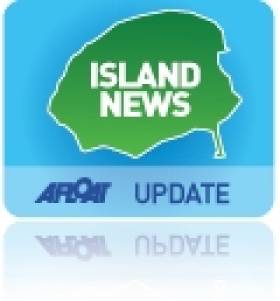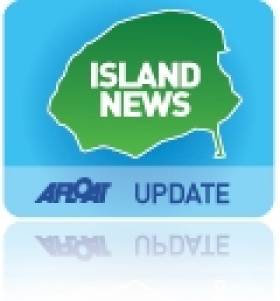Displaying items by tag: Island News
Minister Announces Payments To Island Farmers
#IslandNews - Minister for Agriculture, Food and the Marine Simon Coveney has announced that payments for island farmers under the new Areas of Natural Constraints (ANC) Scheme have started issuing.
“I am particularly pleased to see that these payments, worth some €1 million, are issuing on target, particularly given the significance of these payments to individual island farmers," said the minister, who previously announced the designation of offshore islands in May 2015 as Areas of Specific Constraint under the new Areas of Natural Constraints (ANC) Scheme, which replaced the Disadvantaged Areas Scheme.
The scheme is co-funded by the European Agricultural Fund for Rural Development (EAFRD).
“I am delighted that these payments have commenced to issue given the challenges island farmers face on a daily basis, particularly in view of the difficult weather conditions they have encountered during recent months," said Minister Coveney.
"Island farming is difficult in the best of years and the objectives of this aid is to maintain agricultural production in these areas, to provide a boost to the economic activity on the islands, and to deliver environmental benefits such as the preservation of their unique habitats."
The minister confirmed that payments will continue to issue as individual cases are confirmed eligible for payment in the coming weeks.
Aran Islands Flights Continue Despite No Agreement On New Contract
#AranIslands - Aer Arann has said it will continue to fly to the Aran Islands despite no agreement being reached in its contract negotiations with Government, according to Galway Bay FM.
As previously reported on Afloat.ie, talks got under way earlier this week after the Government's sudden cancellation of its tender for the public service obligation air route to the Galway Bay islands.
Aer Arann's current contract for its plane service between the islands and the Co Galway mainland expired yesterday (Wednesday 30 September) and staff are still on protective notice until an agreement has been reached.
However, the airline confirmed it was offering flights today as a goodwill gesture to Aran Islanders as talks continue. Galway Bay FM has more HERE.
Negotiations Continue Over Aran Islands Air Service Contract
#AranIslands - Further negotiations are planned after "positive" early discussions between the Government and Aer Arann over the proposed continuation of the Aran Islands plane service, according to RTÉ News.
The airline has put its staff of 40 on protective notice, as The Irish Times also reports, but jobs and flights after tomorrow (Wednesday 30 September) are not guaranteed until an agreement has been reached.
It is understood that the State has asked the airline to extend its Public Service Obligation contract for air services to the Aran Islands, following last Friday's about-face over its tender for the route.
That new contract, had it gone ahead, would have seen plane flights to the Galway Bay islands replaced with a helicopter service that faced opposition from local residents.
OPW Confirms 'Repairs' On Skellig Michael After Star Wars Film Shoot
#StarWars - "Incidents" requiring "repairs" by stonemasons following the recent Star Wars film shoot on Skellig Michael have been confirmed by the Office of Public Works (OPW).
As previously reported on Afloat.ie, the week-long film shoot on the Unesco World Heritage site – which includes a monastic site dating to the 6th century, and a sensitive habitat for a number of seabird species – prompted concerns among environmentalists ahead of the production's arrival.
Those worries were dismissed by Arts Minister Heather Humphries, despite mounting criticism from a number of people in the arts connected with the Kerry coastal island, taking her to task for not consulting with the OPW before giving the go-ahead to the Disney-backed film shoot.
Now The Irish Times reports that the minister did not approve the film shoot under section 14 of the National Monuments Act, according to An Taisce - which said it has photographic evidence of fresh repairs to the entrance of the island's monetary and a number of stone steps on the site.
Repairs to the steps were confirmed by the OPW, which said the work was "an entirely normal procedure" at the end of the visitor season.
It has also emerged that Disney Lucasfilm was not charged a facility fee for the recent shoot nor last year's filming on the island for the upcoming release Star Wars: The Force Unleashed.
The Irish Times has more on the story HERE.
Govt Cancels Tender For Aran Islands Helicopter Service
#AranIslands - The Government last night cancelled the tender process for flights to the Aran Islands amid weeks of concern over changes to the Galway Bay islands' air service.
As RTÉ News reports, Minister of State for Gaeltacht Affairs Joe McHugh said the European Commission would be notified before beginning a new tender process, and his department would enter talks with the existing provider Aer Arann about continuing their service after their current contract expires next week.
The decision means that the decades-long airplane service will now not be replaced by helicopter flights out of Carnmore, which were to be provided by the State's preferred tenderer Executive Helicopters.
As previously reported on Afloat.ie, residents had expressed worry and anger over the change, with dismay over the distance between Carnmore and the ferry link at Rossaveal, and concerns over the reliability of helicopter service in often severe weather around the islands.
Only last week public meetings has been held on Inis Mór, Inis Meáin and Inis Oirr to address the uncertainty over the future of the air service.
It since emerged that the Department of the Gaeltacht itself had no confirmation that Galway Airport could be used as a hub for the helicopter service - until Galway councillors passed a motion against it.
As of yesterday (Friday 25 September), Aer Arann had issued no statement over the situation under legal advice after mounting a High Court challenge to the original tender.
And Galway Bay FM adds that helicopters are expected to be eliminated as an option from any new tender contract for Aran Islands flights.
Arts Minister Faces Fresh Criticism Over Skellig Michael Star Wars Shoot
#StarWars - Criticism of the Arts Minister mounts over the latest Star Wars filming project on Skellig Michael, which began filming yesterday (Tuesday 15 September) after poor weather delayed the shoot.
Following a previous lambasting by Fintan O'Toole in the wake of environmentalists' concerns, 12 writers and a photographer associated with the Co Kerry island have signed a letter to The Irish Times taking Minister Heather Humphreys to task for not consulting the Office of Public Works (OPW), which manages the Unesco World Heritage site, before giving the go-ahead to the Disney-backed film shoot.
The Irish Times has more on the story HERE.
Star Wars Filming Delayed By Poor Weather On Skellig Michael
#StarWars - Poor weather today (Monday 14 September) has postponed the start of filming on Skellig Michael for a future Star Wars movie project.
According to The Irish Times, high winds and rough seas off the Iveragh Peninsula meant the film crew's boats stayed in their moorings.
But it's only a temporary delay, despite environmentalists' concerns over the impact of the film shoot on the island's vulnerable colonies of protected bird species.
Arts Minister Heather Humphries recently dismissed such concerns, saying that during the shoot "peak activity levels" will see around 100 people on the island "under strict supervision" with an ecologist and departmental staff on hand to halt proceedings in the event of any threat to wildlife.
"Those attempting to turn this into a negative story seem to be completely overlooking the fact that up to 180 people visit the island on any given day," she added.
However, writing in The Irish Times recently, Fintan O'Toole decried the Government's acquiescence to Star Wars owners Disney over filming privileges at the Unesco World Heritage Site, and the notion that the State has sold out an integreal part of Ireland's national heritage.
"Once Skellig Michael becomes (as film gossip suggests) Luke Skywalker’s refuge," he writes, "it ceases to be our refuge from the endless, voracious insistence on knowing the price of everything and the value of nothing."
The Irish Times has more on the story HERE.
Castaway Wanted to Manage Welsh Island of Bardsey
#CastawayWanted- A castaway is wanted to take over the running of a remote island off the coast of the Llŷn Peninsula, Wales according to the Daily News.
Bardsey Island Trust wants a new manager who will spend 11 months a year living on the scenic island of Bardsey (Ynys Enlli in Welsh), which lies two miles off Aberdaron.
The job comes with some of the best views in Wales, a two bedroom cottage, peace to escape the mainland rat race and a £16,000 pay package.
But it is not all wilderness walks and glorious isolation as among the many duties with the role is office administration and emptying the island's public composting toilet.
Caroline Williams, from the Bardsey Island Trust, said: "This is a unique opportunity to work on a remote and beautiful island.
"There are really two parts to the job".
So what are they?... to find out more click here.
New Tender Cuts Funding To Aran Islands Air Service
#IslandNews - Aran Islanders have expressed concern over a new tender for the air link to the Galway Bay islands that could see a significant reduction in services.
As The Irish Times reports, the new tender for the public service obligation air connection has been capped at €900,000, representing a 30% cut.
And this "major downgrading" will inevitably result in restricted airport opening hours and a rise in fares, according to an Coiste leis an Seirbhís Aeir a Chosaint (the Save our Air Service committee).
The news comes a year after ferry visits to the Aran Islands were shown to have fallen by 20% – and just a few months after nine offshore island communities spoke out over Government plans to stop core funding for development.
The Irish Times has more on the story HERE.
Walker Breaks Leg In Aran Islands Cliff Fall
#IslandNews - A hillwalker in the Aran Islands was lucky to survive a 45-foot fall from a cliff top with only a broken leg, as The Irish Times reports.
The 21-year-old woman had been walking near the Wormhole on Inis Mór yesterday afternoon (Wednesday 8 April) when she was seen falling into the water.
A member of the local Irish Coast Guard unit said she was "very lucky" that whatever broke her fall meant she was spared more serious injury, or even death.
Local people walking in the area also went to her aid till she was airlifted to Galway for treatment.
The Irish Times has more on the story HERE.































































